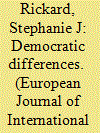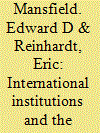| Srl | Item |
| 1 |
ID:
101387


|
|
|
|
|
| Publication |
2010.
|
| Summary/Abstract |
A growing body of literature argues that democracies are more likely to comply with international agreements than authoritarian states. However, substantial variation exists in the compliance behaviour of democracies. How can this variation be explained? The same mechanism that links regime type to compliance, namely electoral competition, also explains variation in compliance among democracies. This is because the nature of electoral competition varies across democratic systems. An analysis of democratic GATT/WTO member countries from 1980 to 2003 reveals that governments elected via majoritarian electoral rules and/or single-member districts are more likely to violate GATT/WTO agreements than those elected via proportional electoral rules and/or multi-member districts.
|
|
|
|
|
|
|
|
|
|
|
|
|
|
|
|
| 2 |
ID:
084825


|
|
|
|
|
| Publication |
2008.
|
| Summary/Abstract |
During the past half-century, states have established a large number of international trade institutions, both multilateral and regional in scope. The existing literature on this topic emphasizes that these agreements are chiefly designed to liberalize and increase the flow of overseas commerce. Yet such institutions have another function that has been largely ignored by researchers, namely, reducing volatility in trade policy and trade flows. Exposure to global markets increases the vulnerability of a country's output to terms of trade shocks. Governments seek to insulate their economies from such instability through membership in international trade institutions, particularly the World Trade Organization (WTO) and preferential trading arrangements (PTAs). We hypothesize that these institutions reduce the volatility of overseas commerce. We further hypothesize that, because market actors prefer price stability, trade institutions increase the volume of foreign commerce by reducing trade variability. This article conducts the first large-scale, multivariate statistical tests of these two hypotheses, using annual data on exports for all pairs of countries from 1951 through 2001. The tests provide strong support for our arguments. PTAs and the WTO regime significantly reduce export volatility. In so doing, these institutions also increase export levels.
|
|
|
|
|
|
|
|
|
|
|
|
|
|
|
|